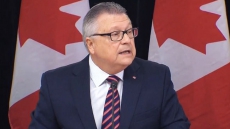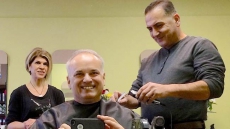CALGARY — It's not clear how many Canadians have applied to the courts for physician-assisted deaths, but some experts say the first case involving a terminally ill Alberta woman has set an example for others who are bound to follow.
The Calgary woman, known only as Ms. S in court documents, was granted an exemption Monday to end her life with the help of two doctors in Vancouver. She died later that day.
Last year, the Supreme Court struck down the law prohibiting medical aid in dying. In January, it gave the federal government more time to craft a new law, but ruled that anyone who wants to die sooner can apply to a judge for an exemption.
Some provinces are tracking requests while others are not.
Alberta Health said it is aware of how many there are in the province, but won't release the number. The Ontario government said it is aware of one exemption application; Nova Scotia's Justice Department has no official tracking; and health officials in Prince Edward Island and Newfoundland and Labrador said they are unaware of any applications.
Quebec has had its own assisted-death law since December. The health authority for the Quebec City area reported the province's first case in mid-January. But total numbers in that province will only be published once a year, probably in June, when an independent commission overseeing cases publishes its annual report.
Montreal lawyer Jean-Pierre Menard, who helped define Quebec's special application process, said there have been at least 20 doctor-assisted deaths in the province since the law came into effect. He has been involved with some of them.
"We will see the number increase rapidly," said Menard, who added about two per cent of the province's deaths each year could meet the criteria for an assisted death. That would be 1,200 a year.
Menard feared the exemption process in other provinces would be complicated, but found the judge in the Calgary case made it flexible. He said the ruling will likely set a precedent for other applications.

Ms. S, who can't be identified due to a publication ban, was in the final stages of amyotrophic lateral sclerosis, or ALS, also known as Lou Gehrig's disease. The disease had left her almost completely paralyzed, unable to speak or swallow liquids and in considerable pain.
Queen's Bench Justice Sheilah Martin ruled Ms. S met the criteria outlined by the Supreme Court. She was a competent adult with a grievous medical condition whose suffering could not be alleviated by any acceptable treatment. And she clearly wanted to end her life.
The woman provided the court with her medical records and statements from doctors. The judge said there was no need for her to be examined by a psychiatrist, a requirement listed by the Chief Justice of the Ontario Superior Court.
Martin further ruled that Ms. S, while required to make the application in her home province, could die anywhere in Canada.
"The court showed compassion, recognized her ability to have competence in making this decision, could see that there was no coercion involved ... and concluded that she should be allowed to do this," said Jim Stephenson of Dying with Dignity Canada.
Stephenson said there need to be more doctors willing to perform assisted deaths. Ms. S went to Vancouver to die with the help of physicians who recently formed a clinic called Hemlock AID. He's not aware of other clinics like it in Canada.
"Imagine Ms. S in the state of ill health and the suffering ... having to fly from Alberta to B.C. Fortunately it's a short flight, but the additional burden of having to travel at that stage points how important it is to have access everywhere."
A CLOSER LOOK A THE ASSISTED-DEATH RULING HANDED DOWN IN ALBERTA THIS WEEK

A judge granted a Calgary woman's application to have a doctor-assisted death, under an exemption allowed by the Supreme Court while the federal government crafts a new law governing the practice. It's believed to be the first granted by a Canadian court.
Queen's Bench Justice Sheilah Martin outlined in her ruling how the process should work in Alberta, noting that she followed the criteria laid out by the Supreme Court.
Here are the things she considered:
— Is the person a competent adult?
— Did the person clearly consent to the termination of life?
— Does the person have a grievous and irremediable medical condition?
— Does the condition cause enduring, intolerable suffering?
— Can the suffering be alleviated by any treatment that is acceptable to the individual?
---
The high court did not dictate what type of evidence was needed, so Martin relied on:
— Affidavits from the applicant.
— Statements from her doctor, the doctor who planned to assist the death and other doctors from an ALS clinic.
— A letter from her best friend.
— A letter the applicant wrote to her lawyer describing her life.
---
Martin noted that different evidence has been suggested in other provinces. In Ontario, she noted that the chief justice of the Superior Court has proposed affidavits from the following people are needed as evidence:
— The applicant.
— The attending doctor.
— A psychiatrist.
— The doctor who would assist in the death
And in British Columbia, she said, the chief justice of the British Columbia Supreme Court suggests affidavits are needed from:
— The applicant.
— Two doctors.
---
Quebec has had its own assisted-death law since December. It does not require a court process; instead people must:
— Fill out a prescribed form.
— Provide statements from two doctors.

.jpg)



